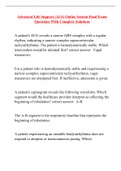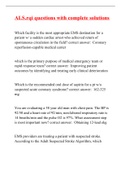ALS/ACLS
Kaplan University
All 9 results
Sort by

-
Advanced Life Support (ALS) Online Session Final Exam Questions With Complete Solutions
- Exam (elaborations) • 25 pages • 2023
-
Available in package deal
-
- $10.49
- + learn more
A patient's ECG reveals a narrow QRS complex with a regular rhythm, indicating a narrow-complex supraventricular tachyarrhythmia. The patient is hemodynamically stable. Which intervention would be initiated first? correct answer: Vagal maneuvers For a patient who is hemodynamically stable and experiencing a narrow-complex supraventricular tachyarrhythmia, vagal maneuvers are attempted first. If ineffective, adenosine is given. A patient's capnogram reveals the following waveform. Which ...

-
ALS.rqi questions with complete solutions
- Exam (elaborations) • 5 pages • 2023
-
Available in package deal
-
- $9.49
- + learn more
Which facility is the most appropriate EMS destination for a patient w/ a sudden cardiac arrest who achieved return of spontaneous circulation in the field? correct answer: Coronary reperfusion-capable medical center which is the primary purpose of medical emergency team or rapid response team? correct answer: Improving patient outcomes by identifying and treating early clinical deterioration Which is the recommended oral dose of aspirin for a pt w/a suspected acute coronary syndrome? co...

-
ACLS Practice Test Questions And ANSWERS VERIFIED
- Exam (elaborations) • 4 pages • 2022
-
Available in package deal
-
- $7.49
- + learn more
Chest compressions for an adult are performed: a. at a rate between 60-80 compressions b. at a rate of at least 80 compressions per minute c. at a rate between 80-100 compressions per minute d. at a rate between 100-120 compressions per minute correct answer: d. at a rate between 100-120 compressions per minute The ratio of compressions to breaths in adults is: a. 15:1 b. 10:2 c. 20:2 d. 30:2 correct answer: d. 30:2 *No matter how many rescuers are available (in adults), the corre...
Bundle for ALS/ACLS - Team Response Scenarios | Updated
![ALS/ACLS - Team Response Scenario - Maurice Van Essen [2022] COMPLETE SOLUTION](/docpics/6315263cd0858_1940012.jpg)
-
ALS/ACLS - Team Response Scenario - Maurice Van Essen [2022] COMPLETE SOLUTION
- Exam (elaborations) • 3 pages • 2022
- Available in package deal
-
- $3.49
- + learn more
On rapid assessment, Mr. van Essen is responsive and his airway is patent. He appears pale and distressed. He is diaphoretic. Select the tools to use during the primary assessment to gather more information about Mr. van Essen's clinical condition. - 1. Pulse Oximetry 2. Cardiac Monitoring 3. Stethoscope 4. Blood pressure monitoring What is your interpretation of the rhythm on the cardiac monitor? First, identify the rhythm. - Mr. van Essen has a narrow-complex supraventricular tach...
![ALS/ACLS - Team Response Scenario - Katherine Archer [2022] COMPLETE SOLUTION](/docpics/631525c12dc33_1940009.jpg)
-
ALS/ACLS - Team Response Scenario - Katherine Archer [2022] COMPLETE SOLUTION
- Exam (elaborations) • 3 pages • 2022
- Available in package deal
-
- $3.49
- + learn more
At minimum, what initial actions should be performed within 10 minutes of Mrs. Archer's arrival at the emergency department? - 1. Conduct the primary assessment. 2. Establish cardiac monitoring. 3. Obtain a full set of vital signs. 4. Order a brain imaging study (CT or MRI). 5. Draw blood for laboratory studies. Which additional assessment should the team perform emergently if it will not delay brain imaging? - 12- lead ECG
![ALS/ACLS - Team Response Scenario - Ross Jenkins [2022] COMPLETE SOLUTION](/docpics/6315258787803_1940007.jpg)
-
ALS/ACLS - Team Response Scenario - Ross Jenkins [2022] COMPLETE SOLUTION
- Exam (elaborations) • 3 pages • 2022
- Available in package deal
-
- $3.49
- + learn more
On rapid assessment, Mr. Jenkins is responsive and his airway is patent. His body language indicates that he is experiencing retrosternal pain or discomfort. He is not visibly dyspneic, cyanotic or diaphoretic and appears to be in minimal distress. What actions should the team take as part of the primary assessment? - 1. Establish cardiac monitoring 2. Establish pulse oximetry. 3. Obtain a full set of vital signs. 4. Assess capillary refill time. Primary assessment findings are as foll...
![ALS/ACLS - Team Response Scenario - Theresa Coleman [2022] COMPLETE SOLUTION](/docpics/6315250c8be68_1940004.jpg)
-
ALS/ACLS - Team Response Scenario - Theresa Coleman [2022] COMPLETE SOLUTION
- Exam (elaborations) • 4 pages • 2022
- Available in package deal
-
- $4.49
- + learn more
Review the rhythm shown here and then decide how Dr. Ruiz should direct the team's immediate next actions. - 1. "Kirron, please continue compressions." 2. "Charmar, please charge the defibrillator." What are the team's appropriate next actions? - 1. Provide 2 minutes of CPR. 2. Obtain vascular access. After 2 minutes of CPR, the rhythm remains the same. What interventions are appropriate at this time? - 1. Epinephrine 2. CPR 3. Shock
![ALS/ACLS - Team Response Scenario - Javier Hernandez [2022] COMPLETE SOLUTION](/docpics/63152498a3fa2_1940000.jpg)
-
ALS/ACLS - Team Response Scenario - Javier Hernandez [2022] COMPLETE SOLUTION
- Exam (elaborations) • 3 pages • 2022
- Available in package deal
-
- $3.49
- + learn more
This is the rhythm that the telemetry technician observed on the cardiac monitor at the central telemetry station. What is your interpretation of the rhythm on the cardiac monitor? - Sinus Bradycardia Based on the primary assessment findings, what additional actions should the team take? - 1. Ensure vascular access and administer atropine. 2. Administer supplemental oxygen. Three minutes after the initial dose of atropine is administered, Mr. Hernandez's heart rate has increased slightly...

That summary you just bought made someone very happy. Also get paid weekly? Sell your study resources on Stuvia! Discover all about earning on Stuvia


